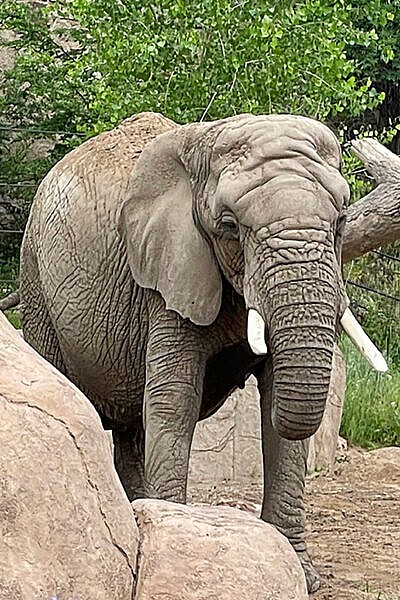At the end of February, Malaika, one of six aging female African elephants at Cheyenne Mountain Zoo, was experiencing increasing mobility issues and severe changes in her appetite. After a few days of close monitoring and treatments to help her symptoms, she started to bounce back and has since continued to trend in the right direction. Although her team is happy to see her improve, they’re realistic, because Malaika – like all of the elephants at CMZoo – will have challenges for the rest of her life. Malaika has a lifelong issue with bowing and lack of strength in right rear leg, which is worsening as she ages.

“Some people are surprised to hear that our elephants deal with some kind of ailment, from time to time, but that’s why they’re here with us,” said Jason Bredahl, Encounter Africa animal care manager. “Our elephant center was designed specifically to care for aging female elephants and to help them with physical challenges as they age. Our keepers and veterinary staff are some of the most knowledgeable elephant experts in the profession. With our experience and the support of our colleagues, our Golden Girls are in great hands here. They’re living their best lives with us.”
Malaika is one of six “Golden Girls” in Encounter Africa, along with Missy, Kimba, Lucky, Jambo and LouLou. They’re all African elephants, but have unique personalities and some distinguishable physical features that help CMZoo visitors recognize and enjoy their individual personalities.
At 52, Missy is one of the oldest African elephants in human care in accredited zoos. She’s often in the yard with LouLou, 39, who is the easiest elephant to identify because she doesn’t have tusks. Kimba, 44, and Jambo, 39, are the largest of the group, weighing around 8,500 pounds each. Lucky, 43, is an enthusiastic mud wallower, and can be seen covering herself with mud in the yards. Malaika, 36, is one of the sassiest in the herd, who frequently carries logs, tires and puzzle feeders. She usually prefers to spend solo time in one of their many exhibit spaces at the Zoo, but hangs out with Kimba and Lucky for social time, too.
Just like humans, the health of each elephant is individual, sometimes regardless of age or environment. Malaika, the youngest of the herd, has experienced perhaps the most life-threatening issues and Missy, the eldest, has been in relatively good health for her age. The elephant care team works to help them comfortably enjoy their golden years, knowing that things can change quickly for them and that even our specialized care has its limits.
“There’s quite a range in their ages, and it’s not necessarily true that the older elephants need more specialized care than their younger friends do,” said Bredahl. “Over time, some have experienced weak limbs or digestive issues, some have arthritis, some have issues with their feet or tusks, and some have all of the above. We work to proactively lessen the impact of expected age-related issues and address anything else that pops up along the way.”
The dedicated Encounter Africa keepers, along with Bredahl, know these elephants like members of their own family. They work so closely with the ladies that they can usually ‘just tell’ if something is off, based on knowing each elephant’s individual behaviors and routines.

“We develop the skills to read their individual behaviors and know their patterns and tendencies,” said Bredahl. “We definitely have bonds with them and can usually tell what kind of a day they’re having based on their responses to training or enrichment activities. The equipment in our elephant center allows us to provide specialized care for them, but our relationships with the elephants guide those care plans, too.”
The Wilgruen Elephant Center, in Encounter Africa, at CMZoo is like a retirement community for elder elephants in the zoo world. This team and environment provide the very best in aging elephant care. Elements of the specialized elephant center include rubberized flooring, natural substrate throughout most of the barn, surveillance that allows the team to check on the ladies overnight, and spaces with activities designed to keep them moving.
The team consistently monitors each elephant’s daily behaviors, too. The elephant care team assesses and documents each elephant every day, so they can spot any trends that need to be addressed. Keepers track each elephant’s appetite, their mobility and interest in training, for example, along with individual indicators that reveal progress or declines in specific ailments, like a stiff knee or ongoing digestive issue. The team reviews each elephant’s data regularly, and makes adjustments to their environment, treatments or routines with hopes to maintain their quality of life.

